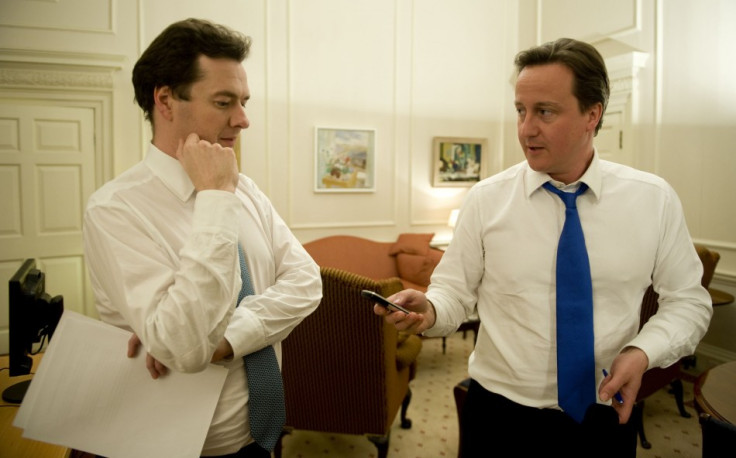UK Recession: ''Plan A' Gamble Calls for One Final Roll of the Dice

For a government that proudly trumpets its Eurosceptic colours, there's a certain irony in the fact that its very survival may be more linked to events in Brussels and Berlin this summer than to anything it's planning to do at home in London.
The abysmal truth of Britain's economic state was laid bare for all to see earlier today with confirmation of the deepest "double-dip" recession in at least half a century, the fourth contraction of the last five quarters and a collapse in construction and manufacturing activity. Added to which is the emphrical fact that Britain has lost nearly a full percent of its economic strength since the coaltion took power two years ago.
Excuses - even valid ones - rarely find support on day like this and the long-assumed costs of the wettest Spring in two centuries, a once in a generation Diamond Jubilee celebration and the slow implosion of our European trade partners is unlikely to engender much sympathy to the men how came to power vowing to "straighten out" a British economy that hasn't stopped wobbling since the global credit crisis shook it foundations four years ago.
It's easy to imagine Prime Minister David Cameron and his Chancellor George Osborne accepting the dismal arithmetic of Britain's sluggish economy as they read critical reports from the International Monetary Fund, concocted and £80bn lending programme with the Bank of England, envisioned infrastructure investments and talked up the impact of Europe's sovereign debt woes on hard-pressed British exporters.
What's hard to picture is the pair changing, in any fundamental way, their austerity-first strategy. And they probably won't have to.
Independent voices are already challenging the accuracy of the Office for National Statistics figures, which they themselves said were subject to "additional uncertainty" owing to the extra June holiday and the soggy spring.
Furthermore, employment is rising, tax receipts are growing and new investment from abroad is starting to find fertile ground: Tata-owned Jaguar Land Rover is planning to add more than 1,100 people to shifts in the West Midlands and a Hitachi-led consortium will add 900 more in County Durham after winning a $4.5bn inter-city train building contract.
But even if that weren't the case, the Cameron and Osborne have far more to risk politically by changing tack and ramping up stimulus spending and investment.
Firstly, it's important to remember that GDP figures measure the pace of change, not the nominal size, of a country's output. So next quarter's figures will represent the change in output from this quarter's 0.7 percent slump. This so-called "base effect" means GDP only has to grow modestly in nominal terms to deliver an eye-catching headline growth figure in October.
Secondly, economists say stimulus spending takes a long time to work its way into the economy and out the back end in terms of growth and production - in some cases as long as 18 months. So announcing a Labour-friendly spending programme wouldn't change GDP figures until at least 2014 - just in time for Cameron and Osborne's political rivals to being their "it was Labour wot turned it around" election campaign.
Finally, the brutal truth is that Britain's staggering 140 percent debt-to-GDP ratio (which includes government-owned bank liabilities) gives it very little wiggle room to toy with an increasingly erratic bond market, even as gilt yields test historic lows. Don't forget: the Bank of England needs to give back the £375bn it bought from the market at *some* stage and, along with foreign investors, owns around 53 percent of our Gilt stock.
So it's a nervous wait for George and Dave as they hope for a "bread and circuses" distraction from the London Olympics and some hopefully pleasant August weather to ride out the current news cycle that paints them as the most incompetent economic duo since Laurel and Hardy started a boat-painting business.
Come September, though, the stakes begin to rise and the controls slip from their fingers. If Spain goes "full bailout" and takes bondholders with it, the Eurozone recession will bite hard and may trigger the loss of Germany's triple-A credit rating. If Greece's government pushes too hard for concessions on its €240bn bailout and losses the patience of the Troika, it could get pushed out of the single currency - and then it's "jeu sont fait" as to what sort of impact that will have on market sentiment and the broader economy.
If those two disasters are somehow averted, the Cameron and Osborne might find just enough time to steal the October headlines and hope that the recovery has gained the kind of foothold the number crunchers have calculated.
On current form, it would be a foolish wager to stake your fortunes on the ability of the Brussels and Berlin to steer the SS Eurozone through the oncoming ice-floes.
But it's pretty much all that's left on the tattered betting slip known as Plan-A.
© Copyright IBTimes 2025. All rights reserved.





















